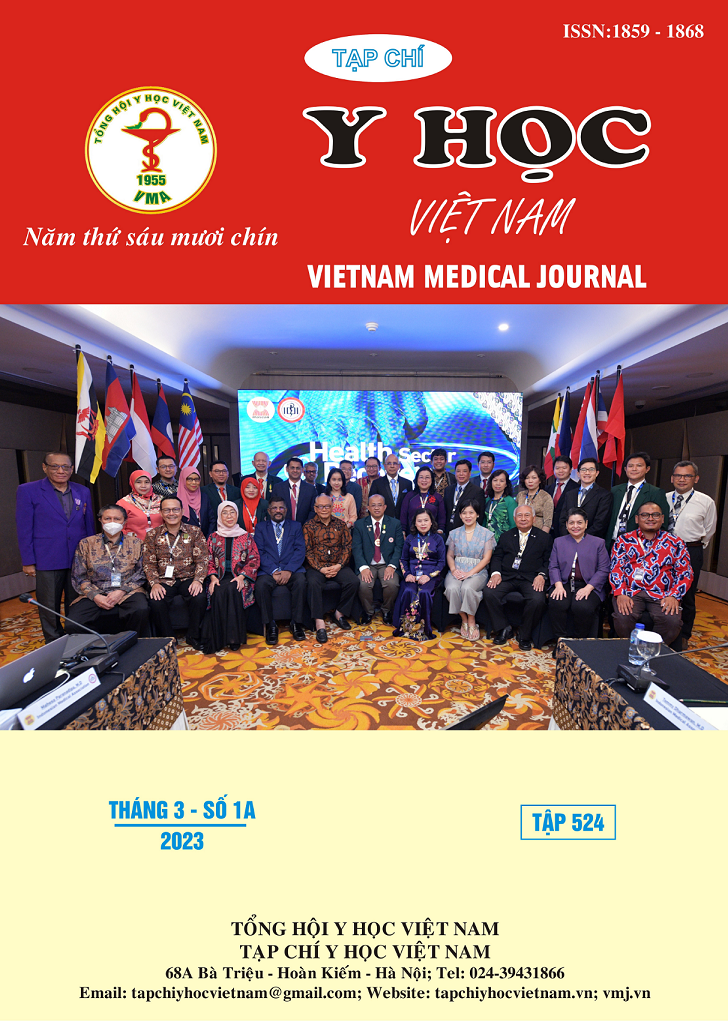TRANSLATION AND VALIDATION OF THE VIETNAMESE VERSION OF THE PATIENT – COMPLETED ASTHMA KNOWLEDGE QUESTIONNAIRE (PAKQ)
Main Article Content
Abstract
Objectives: To translate and validate the Vietnamese version of The Patient – completed Asthma Knowledge Questionnaire (PAKQ). Methods: Translation and cross-cultural adaptation of the PAKQ into Vietnamese based on the guidelines of Beaton et al. were undertaken in five stages: forward translation, synthesis, back translation, expert committee review, pilot testing with 35 patients with asthma. Subsequently, a cross-sectional study was conducted on 345 patients with asthma at the University Medical Center in Ho Chi Minh City, Vietnam. Internal consistency was evaluated using Cronbach’s alpha and Corrected Item – Total Correlation. Test- retest was assessed over the two-week interval by using the intraclass correlation coefficient (ICC) among patients who had their asthma condition or treatments unchanged during the interval. Results: The mean scores of the four criteria demonstrated good equivalence to the original version of PAKQ: semantic (0.99); idiomatic (0.99); experiential (1.00) and conceptual equivalence (1.00). Cronbach’s alpha coefficients were acceptable for the whole questionnaire (0.933) and for individual domains: About asthma (0.793); Asthma triggers (0.790); Diagnosis and management (0.849); Treating asthma (0.582). The translated PAKQ achieved good test-retest repeatability with an ICC of 0.913 for the total score and ICCs for the four individual domains > 0.8 (0.852, 0.850, 0.857 and 0.801). Conclusion: The Vietnamese version of PAKQ can be considered as a reliable questionnaire to evaluate the knowledge of adult patients with asthma in Vietnam.
Article Details
Keywords
Asthma, PAKQ, questionnaire, knowledge, patient, translation, validation
References
2. Nguyễn Quang Chính (2017), Nghiên cứu thực trạng và giải pháp can thiệp truyền thông giáo dục sức khỏe trong kiểm soát bệnh hen phế quản ở người trưởng thành tại huyện An Dương, Hải Phòng, Luận án Tiến sĩ Y tế công cộng, ĐH Y Dược Hải Phòng.
3. Daniel Beaurivage et al (2017), “Validation of the patient-completed asthma knowledge questionnaire (PAKQ)”, Journal of Asthma, 55, 169-179.
4. Bo Peng et al (2022), “Translation and validation of the Chinese version of Patient-completed Asthma Knowledge Questionnaire and its implementation in patient education”, Journal of Thoracic Disease, 14(4), 905-918.
5. Beaton DE, Bombardier C, Guillemin F, et al. (2000), “Guidelines for the process of cross-cultural adaptation of self-report measures”, Spine, 25(24), 3186-3191.
6. Architha A. and Aithal P. (2020), “Development and Validation of Survey Questionnaire & Experimental Data-A Systematical Review-based”, International Journal of Management, Technology and Social Sciences,5, 233-251.
7. British Thoracic Society (2014), British Guideline on the Management of Asthma.
8. Trần Hoàng Tiên (2018), “Thẩm định độ tin cậy của bộ câu hỏi mini asthma quality of life questionnaire (MINIAQLQ) phiên bản tiếng Việt”, Y Học TP. Hồ Chí Minh, 22 (1), 119-123.


